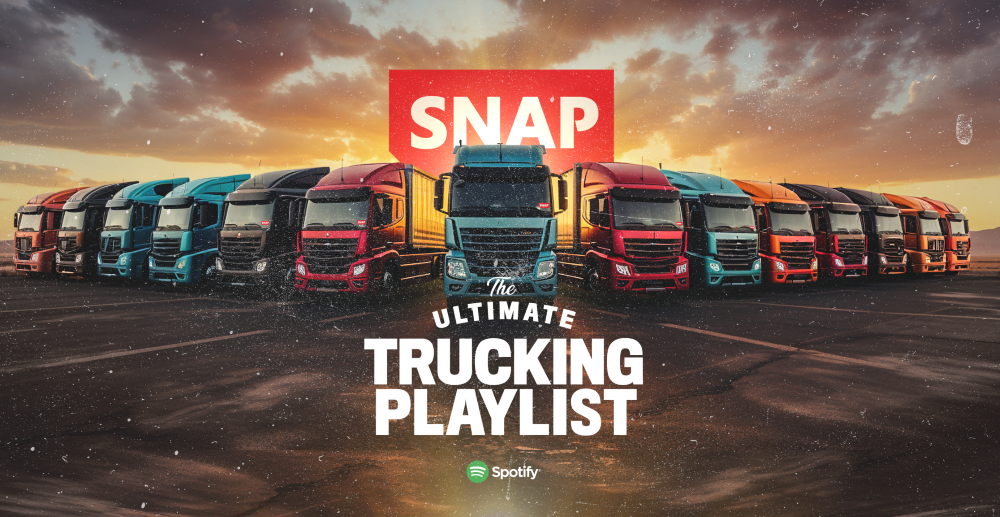
Susie Jones
Puterea muzicii în industria camioanelor
Creat: 28.08.2024
•
Actualizat: 28.08.2024
Pentru șoferii de camioane care traversează la nesfârșit Marea Britanie și Europa, muzica este mai mult decât un simplu zgomot de fond - este un companion care le alină plictiseala și îi menține atenți, implicați și concentrați asupra călătoriei care urmează. Muzica poate îmbunătăți bunăstarea șoferului și siguranța pe șosea.
De ce muzica este importantă pentru șoferii de camion
Cu multe ore pe drum și zile petrecute departe de prieteni și familie, viața unui șofer de camion poate fi uneori singuratică. Muzica poate schimba o călătorie prin ridicarea spiritelor și menținerea unui șofer concentrat pe drum. De asemenea, muzica poate oferi liniște și calm în timpul liber al șoferului.
Muzica și siguranța șoferilor
Muzica nu numai că previne plictiseala pe șosea, dar poate afecta și siguranța rutieră. Un studiu a arătat că muzica tare (orice peste 95 de decibeli) poate reduce timpul de reacție cu până la 20%. Studiul a demonstrat, de asemenea, că muzica la 55 de decibeli îmbunătățește performanța la volan - aceiași șoferi au performat mai bine decât cei fără muzică.
Muzica poate, de asemenea, să vă modifice starea de spirit în situații stresante - rock-ul ușor și jazz-ul pot îmbunătăți concentrarea și focalizarea șoferului. Pentru cei cărora le place muzica cu ritm mai rapid, atenție. Testele au demonstrat că muzica cu un număr mai mare de bătăi pe minut are mai multe șanse să vă determine să conduceți repede și să vă subestimați viteza. În unele cazuri, muzica mai rapidă a dus la șovăieli, la nerespectarea semafoarelor roșii și la creșterea ratei coliziunilor.
Cercetările efectuate de [Autotrader] (https://www.autotrader.co.uk/cars/leasing/music-to-stay-in-control/) au arătat că cele mai bune melodii pentru șoferii de camioane provin de la artiști pop, deoarece îmbunătățesc concentrarea - studiul a fost realizat pe baza unei serii de teste de percepție a pericolelor în timp ce se ascultau liste de redare de la 20 de artiști diferiți. Drake s-a clasat pe primul loc cu un scor de 59,5/75, în timp ce Ariana Grande și Eminem s-au clasat pe locul al doilea cu scoruri de 58,5/75.
Efectul asupra sănătății fizice și mentale
[Fundația JED] (https://jedfoundation.org/resource/how-music-can-improve-your-mental-health/) a constatat că muzica este benefică pentru sănătatea mintală din diverse motive:
Distracție - Muzica vă poate distrage atenția de la lucrurile care vă deranjează și poate servi drept loc de evadare.
Nivelul de stres - Anumite tipuri de muzică pot reduce nivelul de cortizol, ducând la reducerea stresului. Ascultarea muzicii care vă place eliberează, de asemenea, endorfine - oferindu-vă un sentiment de bunăstare.
Activează creierul - Un studiu realizat de [AARP] (https://www.health.harvard.edu/blog/why-is-music-good-for-the-brain-2020100721062) a arătat că cei care ascultau muzică în mod regulat au observat o scădere a nivelului de anxietate și depresie. În plus, 69% dintre cei care asistau adesea la spectacole muzicale și-au evaluat sănătatea creierului ca fiind excelentă sau foarte bună.
Stimulează starea de spirit - Cântecul preferat al cuiva îi poate ridica instantaneu starea de spirit.
Muzica nu afectează doar sănătatea mentală, ci și sănătatea fizică a unui șofer. Un [studiu] (https://www.medicalnewstoday.com/articles/327016#Music-may-lower-cardiovascular-stress) realizat de mai multe universități din Brazilia, Marea Britanie și Italia a sugerat că ascultarea muzicii are un impact asupra stresului cardiovascular. Studiul a constatat o reducere a stresului cardiac atunci când se asculta muzică în timp ce se conducea.
Lista de redare Ultimate Trucking
The Ultimate Trucking Playlist a fost realizat pentru șoferi, de către șoferi. În fiecare săptămână, solicităm comunității noastre de șoferi de camioane să voteze melodiile pe care ar dori să le asculte pe drum. Asigurați-vă că melodia dvs. preferată se află pe listă accesând pagina noastră Facebook.

Șoferii de camioane se uită la televizor?
Cu orele petrecute la volan, mulți șoferi își petrec timpul liber uitându-se la emisiuni TV și filme. Serviciile de streaming au făcut ca șoferilor să le fie mai ușor ca niciodată să aibă acces la cele mai recente lansări. În plus, multe camioane sunt echipate cu opțiuni de montare a sateliților - permițându-le șoferilor să urmărească TV în direct din confortul cabinei lor.
Ascultă camionagii cărți audio?
Muzica joacă un rol esențial în călătoria unui șofer de camion, însă nu este singurul lucru care ține plictiseala departe pe drumurile lungi. După ce a discutat cu un grup de șoferi de camion despre preferințele lor în materie de ascultare, [Road Pro] (https://www.roadprobrands.com/blog-posts/what-do-truckers-listen-to-while-driving) a constatat că audiobook-urile ocupă locul al doilea în topul preferințelor, radioul tradițional fiind pe primul loc.
Utilizarea cărților audio la volan a fost examinată cu atenție, mulți sugerând că acestea distrag atenția. Deși muzica este mai ușor de ignorat, acest lucru nu înseamnă că audiobook-urile sunt nesigure. Studiile au descoperit că mulți șoferi nu au fost afectați de ascultarea unui audiobook - acest lucru s-a întâmplat doar pe cursuri "plictisitoare". Șoferii aflați pe terenuri mai înșelătoare au întâmpinat dificultăți în a reacționa rapid.


